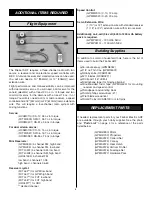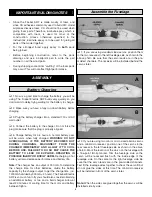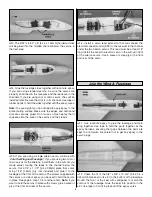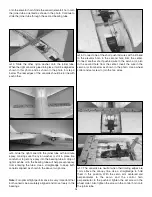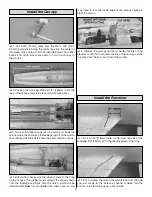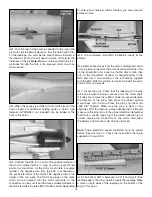
The C.G. (center of gravity) must be checked when the
model is ready to fly with the propeller and battery installed.
❏
1. Use a felt-tip pen or narrow strips of tape to mark the
balance point on the bottom of the wing 4-1/2" [115mm]
from the leading edge of the wing on both sides of the
fuselage.
❏
2. Lift the model, right side up, at the balance point you
marked on the bottom of the wing. If the nose drops the
model is nose-heavy and you must add weight to the tail. If
the tail drops, the model is tail-heavy and you must add
weight to the nose. In most cases you can relocate the
receiver and battery to achieve the correct balance without
adding additional weight. Our prototype models did not
require any weight to balance.
❏
3. If additional weight is required to balanced the model,
use small pieces of Great Planes stick-on weight (GPMQ4485).
If weight is required in the tail, it can be stuck to the top of
the wing next to the motor. If weight is required in the nose,
a slot can be cut in the nose where the weight can be
inserted. The slot can then be covered with tape.
❏
4. After placing weight on the model where necessary,
recheck the C.G. to confirm that it is correct.
No matter if you fly at an AMA sanctioned R/C club site or if
you fly somewhere on your own, you should always have
your name, address, telephone number and AMA number
on or inside your model. It is required at all AMA R/C club
flying sites and AMA sanctioned flying events. Fill out the
identification tag on page 19 and place it on or inside
your model.
Be certain the transmitter batteries are fully charged. Follow
the battery charging instructions that came with your radio
control system to charge the batteries.
Charge the Transmitter Batteries
Identity Your Model
IMPORTANT:
The C.G. (center of gravity), or balance
point has the greatest effect on how a model flies. Do not
overlook this important procedure. Modelers who do so
often find that the airplane is difficult to control, or out of
control after it is too late. Preserve your model and insure
that the first flight won’t be the last by balancing the model
according to the following instructions.
Balance the Model (C.G.)
Set up the Firebat ARF so it has the following control
surface throws:
CANARD (ELEVATOR):
(High Rate)
9/16" [15mm] up and down
(Low Rate)
3/8" [10mm] up and down
AILERONS:
(High Rate)
3/8" [10mm] up and down
(Low Rate)
5/16" [8mm] up and down
Second to the C.G., the control throws have the greatest
effect on the way a model flies. Set the throws as close to
these settings as possible. If you have too much control
throw the model may respond too quickly. If you do not
have enough throw you may not be able to maneuver the
model or have enough control to land it when the motor
is off.
16


